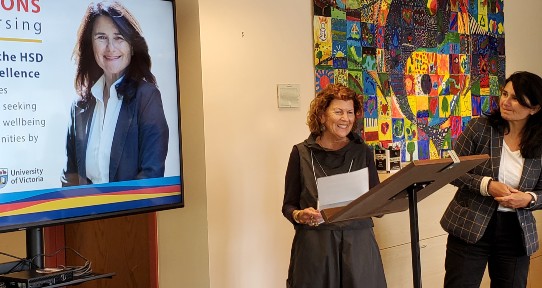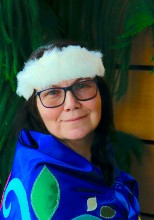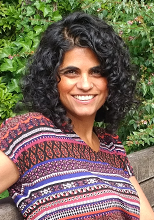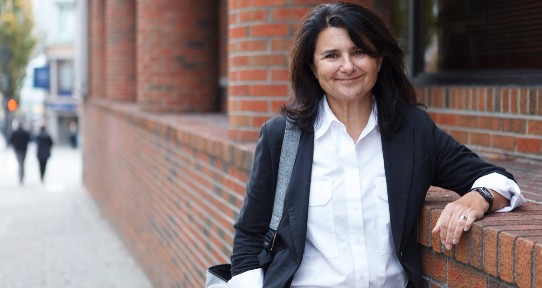Research excellence winners put community at heart of their work

From working with immigrant and refugee groups to empowering First Nations youth, the winners of the inaugural HSD Research Excellence Awards put communities at the heart of their research.
Three faculty members were recognized at HSD Research Day in May at the University of Victoria for seeking to build just, equitable, decolonial and sustainable futures through their research.
Early Career Research Excellence Awards were given to Mandeep Kaur Mucina, associate professor in the School of Child and Youth Care, and Nancy Clark (pictured above), assistant professor in the School of Nursing, for their projects with immigrant and refugee communities.
Mucina’s most recent research project, Bordering Practices, funded by a Social Sciences Humanities Research Council (SSHRC) Insight Development Grant, investigates the precarious status of immigrants and refugee families and their encounters with child welfare systems in Ontario and British Columbia.
Clark, whose research seeks to improve the mental health and wellbeing of immigrant and refugee communities, has started a new arts-based project focused on exploring the mental health of Syrian men now living in Surrey. The work is also funded through a SSHRC Insight Development Grant.
The HSD Indigenous Research Excellence Award was given to Sarah Wright Cardinal, assistant professor in the School of Child and Youth Care, who was recognized for her work with the Pacheedaht First Nation. The two-year SSHRC Partnership Development grant focuses on helping young men reclaim Nuu-chah-nulth teachings through building and launching a 33-foot cedar dug-out canoe (čupuc).
Acting Associate Dean Research Hōkūlani Aikau says the winners demonstrate the transformative potential of collaborative research.
“Research is most exciting, generative and powerful when we’re collectively working together to solve problems. That process is what keeps us coming back and is at the heart of these scholar researchers’ work,” she says.
Seven graduate students and their mentors also presented at the day-long HSD Research Day event, which focused on celebrating the next generation of researchers. Aikau drew a parallel between the relationship of the research winners and their nominators and that of graduate students and their mentors.
Each of the award nominators presented at the event with the winners, which Aikau says emphasized the value of these life-long mentorships.
“It was an important moment to show students this collaborative relationship they’re experiencing as graduate students will continue on in their careers,” she said.
Read on to find out more about the HSD Research Excellence Award winners.

Sarah Wright Cardinal
HSD Indigenous Research Excellence Award
Sarah Wright Cardinal describes her role of researcher in community as one of helper and facilitator.
A Cree educator from northern Treaty 8 territory with Coast Salish, Dene, and Nuu-chah-nulth extended family relations, Cardinal’s work centers on healing from colonial disruptions to Indigenous identities. As an assistant professor in the School of Child and Youth Care, Cardinal uses land, water and spirit-based teachings and practices to support children, youth and community wellness.
Her commitment to this work is evident in her two-year partnership with the Pacheedaht First Nation through which the community is reclaiming Nuu-chah-nulth teachings to empower and strengthen the roles and responsibilities of Pacheedaht young men.
For four months last year in the south-west Vancouver Island community, a master carver guided two youth apprentices in shaping a seaworthy cedar dug-out canoe, the Pacheedaht’s first čupuc (pronounced chuh-PUTZ) carved there for more than 20 years.
Other activities that formed part of the SSHRC Partnership Development Grant included Elder craft circles with young people, culture nights, a guest speakers’ series featuring Nuu-chah-nulth role models, a curriculum for the community school, and the development of a soon-to-be published bilingual children’s book.
HSD’s Indigenous Research Excellence Award is Cardinal’s third award in months. In April, she received the Ehor Boyanowsky Academic of the Year Award from the Confederation of University Faculty Associations of British Columbia for outstanding academic achievement.
In May, she also received the Emerging Voices in Indigenous Scholarship/Researcher Award, Indigenous Inquiries Circle (IIC) – International Congress of Qualitative Inquiry.
For Cardinal, it’s crucial that the results of her research stay within the community. She sees herself as playing a supporting role in a community wellness vision that is driven by the Pacheedaht.
“It’s good the university community is starting to elevate and recognize this way of doing work,” she says. “I feel it’s a critical time in the academy, especially at UVic, to be able to demonstrate and articulate responsible, community-led research.”

Mandeep Kaur Mucina
Early Career Excellence Award
He came to Canada as a refugee from Somali but after ending up in foster care and serving time in the criminal justice system, Abdoul Abdi faced deportation to a country he had fled as a child.
High-profile cases such as Abdi’s have made headlines in Canada in recent years. Mandeep Kaur Mucina, an associate professor in the School of Child and Youth Care, conducted a UVic-funded study in 2019 with former youth-in-care in Nova Scotia whose precarious immigration status put them in danger of being deported.
Concerningly, Mucina, a former youth and child care worker and social worker, says even less research has been done into the situation in British Columbia.
“Not a lot of people are keeping track of this. It’s even horrifying to think I found four people in one province going through this,” she says.
Mucina’s new SSHRC-funded research project, Bordering Practices, will shed light on the how children, youth and families with precarious status experience child protection systems in BC and Ontario, which has particularly affected young people of colour and Black communities. Her research will examine where immigration enforcement and child welfare intersect.
“We know very little how child protection workers work with migrant communities,” she says. “Are they participating in further policing and surveillance? Are systems working with people to be stable and secure here? And what role does systemic racism play?”
At the heart of the issue is a clause in Canada’s Immigration and Refugee Protection Act that states that any non-citizen with a penal sentence over six months may be deemed inadmissible to the country. That same law applies to youth who have aged out of care who don’t have citizenship, often at no fault of their own after being removed from their families by the child welfare system.
Abdi, ultimately, had his deportation order cancelled partly because of the public outcry around his case.
For Mucina, who joined UVic in 2017 from Dalhousie University, this latest project is an extension of her past research with migrant communities around gender-based violence against women and girls, and critical analyses of the impacts of child welfare systems on Indigenous, Black and racialized children, youth, families and communities.
“To receive this accolade is quite overwhelming,” she says of receiving the award. “I feel very honoured and humbled by the whole experience.”

Nancy Clark
Early Career Excellence Award
A community mental health nurse and clinician by training, Nancy Clark spent three decades working in underserved communities, including on the downtown Eastside and with people with acute mental health issues.
When Clark turned to academia, it was only natural then for her to focus on community-based research.
Since joining the School of Nursing at the University of Victoria in 2017, Clark has conducted numerous research projects to improve the mental health and wellbeing of immigrant and refugee communities, working with not-for-profit agencies such as MOSAIC, the Inter-Cultural Association of Greater Victoria, DIVERSEcity and Options BC, Bridge for Health.
Some of her most recent work uses arts-based methods to decolonize research including an Art-On-The-Go project that had racialized youth design safer communities in Surrey by creating a walking tour prototype. Now, Clark is embarking on a SSHRC-funded project that brings Syrian men together to talk about their mental health, experiences of integrating into Canada, and finding employment. Clark says the project will use photography to tell stories for social change.
"They have ownership over the work and they decide what they want to be done with that story,” Clark says. “It puts the community and participants at the centre of knowledge production, meaning they’re the knowledge holder, they’re the experts.”
Fourteen men have joined—the group met recently for the first time—and the project’s peer facilitators are Syrian refugee men, including the cofounder of the White Helmets and a member of the UVic Syrian Men’s Quartet. The project’s research assistant is an international student and graduate student in the Social Dimensions of Health program.
Clark says refugee men are often underserved in academic research.
“My hypothesis is, if we want to help women and families, we also need to help men and provide social structures to support them,” Clark says. “Men are particularly challenged because they don’t talk about things like mental health or emotions because of ideas they might have around masculinity.”
Clark’s work with immigrants and refugees has a personal dimension. She immigrated to Canada with her family in 1974 from the former Yugoslavia. Her father was Palestinian and her mother Croatian. She didn’t speak English at home and her family experienced racism, so much so that her father Anglicized their Arab surname.
“When you do community work, it’s never disconnected from who you are and the values that you have,” she says.
As for the research award, Clark says she was honored that her activism and community-based research is recognized and supported by faculty at UVic.
“To have my research validated by the faculty was heartfelt and meaningful and made me feel really grateful.”
